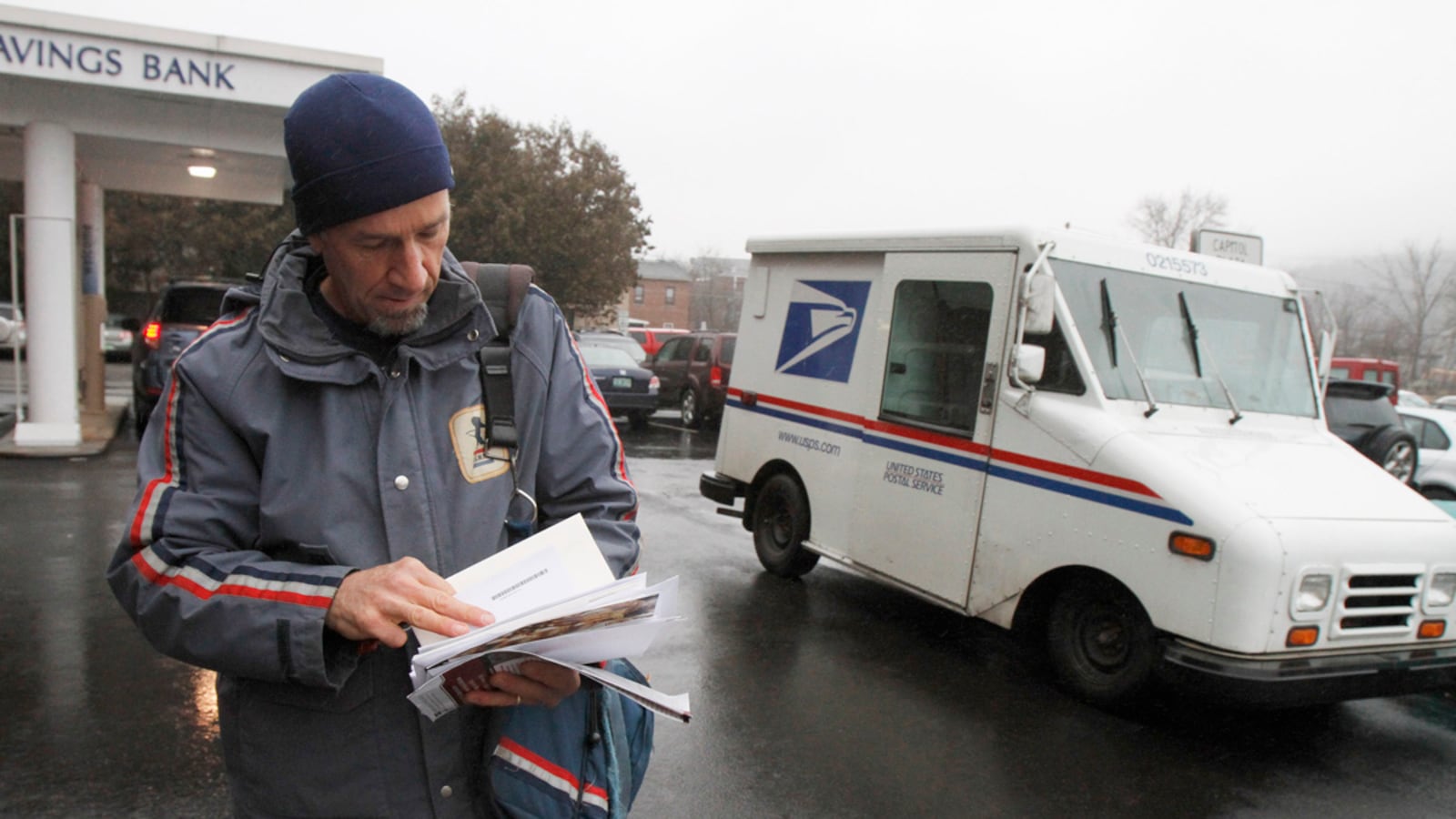A crowded post office is part of the scenery of the season-–long lines, arms full of packaged presents, spare Christmas decorations hanging under the humming lights.
But the post office as we know it is in peril, bleeding $5 billion a year in losses. The culprit isn’t just the rise of the Internet as an alternative to envelopes and stamps. It’s a series of stifling regulations imposed on the organization by Congress, such as requiring the U.S. Postal Service to fully fund all its future pension obligations outright—a measure that would bankrupt any city, state, or business.
It is a solvable problem, but unless our dysfunctional divided Congress takes action in the New Year, post office closures and reduced hours will be the least of our worries. Without reform, America faces the very real possibility that the USPS will not be able to make its payroll in the summer of 2012.
In some ways the U.S. Postal Service is an exemplary civic institution, fulfilling its foundational mandate “to bind the Nation together through the personal, educational, literary, and business correspondence of the people.” And perhaps contrary to the impulse of reflexive government cutters, it does not currently cost the U.S. taxpayer a dime. Part of the genius of the place is that it is self-funded by the price of stamps and services provided, recording year-end profits and losses. Imagine if more government worked along those logical lines.

But it’s not a business. “If we were a private sector company, we would have already declared bankruptcy,” says USPS press spokeswoman Susan McGowan.
The amount of mail circulated has been in decline since 2006, despite America’s rising population. The USPS has taken proactive steps to cut costs, reducing its workforce by more than 120,000 employees over the past four years and slashing operating expenses by more than $12 billion-–all while reaching 150 million American households and businesses each day and generating almost $1 trillion in economic activity. But the long-term trend is not its friend, and Postmaster General Patrick Donahoe has been fighting for greater flexibility to meet the challenge of change.
“You know that phrase ‘speed kills?’ Well, the lack of speed will kill the Postal Service.” Donahoe stated in a November 21 speech at the National Press Club. “That’s the stark choice: A more flexible business model that allows us to control costs quickly, or very large losses that will ultimately burden the taxpayer.”
To that end, Donahoe has been pushing a plan to consolidate 260 processing centers along with lobbying Congress for a change to its absurd pension funding requirements. Another option would be to reduce the current six-day delivery schedule to five days a week. Donahoe states that the necessary route to fiscal stability would require $20 billion in annual costs cut by 2015.
Shutting large numbers of local post offices would seem to be the least desirable route, especially from a citizens’ perspective. These still serve as touchstones for communities, a place where neighbors gather and in many cases the most direct daily contact they have with their federal government. Changing the funding formula for pensions is the most logical and painless solution. Some union representatives might object, but the stark alternative is a looming GM-style bailout for the U.S. Postal Service.
This is a scenario that the USPS leadership seems determined to avoid. “Congress can increases the Postal Service's borrowing limit, but that is not something we are seeking because it does not offer a long-term solution to our financial crisis,” attests Susan McGowan. This is an unusually responsible approach by a federal bureaucracy.
The good news is that there is a bipartisan bill--co-sponsored by centrist Senators Joe Lieberman, Tom Carper, Scott Brown, and Susan Collins--that would modernize the U.S. Postal Service and deliver many of the changes that the postmaster general is requesting in terms of cutting operating costs and creating the flexibility to increase revenue. Known as the 21st Century Postal Service Act, it was proposed in November and received the requisite hearings on the Homeland Security and Government Affairs Committee. But the bill still needs to be given a green light by Senate Majority Leader Harry Reid to go to the Senate floor for a vote.
This should be filed under “No Brainer.” Only senators completely in the thrall of unions or those who might cynically see political benefit in the symbolism of the U.S. Postal Service unable to meet payroll in the heat of a presidential election summer would oppose it. But the pervasive political brinksmanship on Capitol Hill has displayed a repeated ability to screw up a two-car parade. Failure to act could do what rain, sleet, and snow have failed to do--stop the delivery of the mail.
Let’s hope this urgent and worthy effort to save the USPS from insolvency is exempted from the usual polarized paralysis. The citizen reaction to an avoidable post-office crisis would be swift and merciless, pushing congressional approval ratings to new lows. The alternative--reasoning together in a spirit of long-term fiscal responsibility--could restore some faith in Congress while strengthening the core, constitutionally mandated civic institution that is the United States Postal Service.





